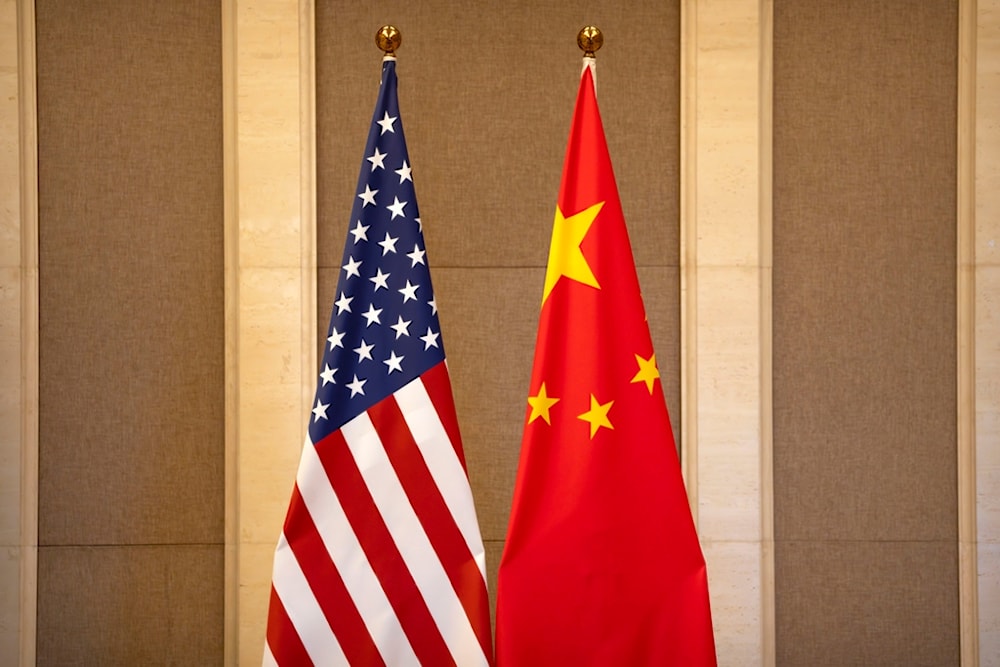China urges US to 'correct mistakes' after Taiwan independence update
The US State Department's update to the Taiwan section of its website no longer includes the phrase "we do not support Taiwan independence."
-

United States and Chinese flags are set up before a meeting between Treasury Secretary Janet Yellen and Chinese Vice Premier He Lifeng at the Diaoyutai State Guesthouse in Beijing, on July 8, 2023. (AP)
The US State Department announced that it has made a routine update to the Taiwan section of its website, following the removal of language stating that Washington does not support Taiwan’s formal independence—one of several changes welcomed by Taipei.
The updated fact sheet, published last week, maintains the US position opposing any unilateral change to the status quo by either Taiwan or China, which claims the self-governed island as its own.
However, the revised page no longer includes the phrase "we do not support Taiwan independence" and now references Taiwan’s collaboration with a Pentagon-led technology and semiconductor development initiative. It also affirms US support for Taiwan’s participation in international organizations "where applicable".
The website update comes approximately three weeks after US President Donald Trump, a Republican, began his second term in office.
While the United States, like most countries, does not maintain formal diplomatic ties with Taiwan, it remains the island’s most significant international backer and is legally bound to provide it with defensive capabilities.
"As is routine, the fact sheet was updated to inform the general public about our unofficial relationship with Taiwan," a State Department spokesperson said in an email sent late Sunday.
"The United States remains committed to its one China policy," the spokesperson affirmed, referring to the term that indicated that Washington takes no official stance on Taiwan’s sovereignty and only acknowledges China's position on the matter.
"The United States is committed to preserving peace and stability in the Taiwan Strait," the spokesperson continued.
"We oppose any unilateral changes to the status quo from either side. We support cross-Strait dialogue, and we expect cross-Strait differences to be resolved by peaceful means, free from coercion, in a manner acceptable to people on both sides of the Strait."
On Sunday, Taiwan’s Foreign Minister Lin Chia-lung expressed appreciation for what he described as Washington’s "support and positive stance on U.S.-Taiwan relations."
Taipei firmly rejects Beijing’s sovereignty claims, asserting that only the island’s people can determine their future. Taiwan considers itself an independent country under the official name "Republic of China," a government that retreated to the island in 1949 after losing the Chinese Civil War to Mao Zedong’s Communist forces, who established the People’s Republic of China.
China calls on US to 'correct its mistakes'
On its part, China on Monday called on the United States to "correct its mistakes" following the US State Department’s removal of previous wording from its website that stated it did not support Taiwan’s independence.
Beijing consistently condemns any form of international recognition of Taiwan or official interactions between Taiwanese and foreign officials, viewing such engagements as encouragement for Taiwan’s separate status from China.
Speaking in Beijing, Chinese Foreign Ministry spokesperson Guo Jiakun criticized the revisions to the State Department’s Taiwan fact sheet, calling them a significant step backward that "sends a seriously wrong message to Taiwan independence separatist forces."
"This is yet another example of the United States' stubborn adherence to the erroneous policy of 'using Taiwan to suppress China'. We urge the United States side to immediately rectify its mistakes," Guo stated.
Read more: Xi reaffirms commitment to Taiwan reunification in new year address

 3 Min Read
3 Min Read










